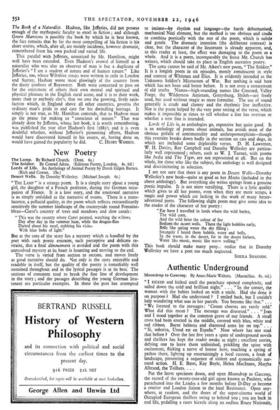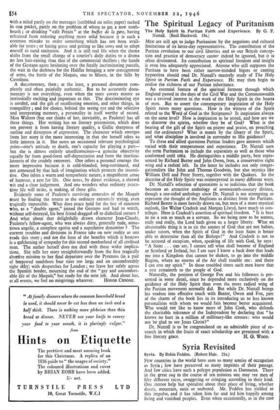Authentic Underground
Moondrop to Gascony. By Anne-Marie Walters. (Macmillan. 8s. 6d.)
" I KICKED and kicked until the parachute opened completely, and sailed down the cold-and brilliant night." . . . " In the corner, the woman with the babies looked on with a smile. Had she done it on purpose ? Had she understood ? I smiled back, but I couldn't help wondering what was in her parcels. You become like that." .. " We listened to the messages : ' Cream cheeses are rarely sold.' What did this mean ? The message was distorted." . . . " Jean and I stood together at the common grave of our friends. A small cross had been erected in the middle, covered with blue, white and red ribbon. Burnt helmets and shattered arms lay on top." . . . " Si, senorita, Usted est en Espafia." Now where has one read that before ? Over the last five years a spate of underground novels and thrillers has kept the reader awake at night ; excellent stories, defying one to leave them unfinished, prickling the spine with excitement, flicking a nerve of horror here, touching a spring of pathos there, lighting up entertainingly a local custom, a freak of landscape, presenting a sequence of violent and economically nar- rated action. H. E. Bates, Kay Boyle, Helen MacInnes, Martha Albrand, the Teilhets. . . .
Put the latest specimen down, and open Moondrop to Gascony, the record of the twenty-year-old girl agent known as Paulette, who parachuted into the Landes a few months before D-Day to become a courier and London liaison to the local Resistance. Open any- where, at random, and the doors of the super-cinema world of Occupied European thrillers swing to behind you ; you are back in real life, pedalling a rusty bicycle along an endless Route Nationale,
with a mind partly on the messages (scribbled on toilet paper) tucked in one pocket, partly on the problem of where to get a new tooth- brush ; or drinking "cafe Petain" at the buffet de la Bare, having refrained from ordering anything more solid because it is such a common mistake to order something which has not been avail- able for years ; or hating geese and getting to like cows and to adapt oneself to rural sanitation. And it is still real life when the theme shifts from the small change of a courier's daily duties to a drama no less hair-raising than that of the commercial thrillers ; the hands of the Gestapo agent hesitating over the fatally incriminating parcels, the wait in the darkness for the Halifax bringing a new consignment of arms, the battle of the Maquis, one to fifteen, in the hills by Castelnau.
A documentary, then ; at the least, a personal document com- pletely and often painfully authentic. But to be accurately docu- mentary is not everything, even when the story covers matter so intrinsically exciting and important as this. The discriminating eye is needed, and the gift of recollecting emotion, and other things, in tranquillity ; and for choice, behind the seeing eye and the selective and interpreting memory, a personality in itself worthy of record. Miss Walters (but one thinks of her, inevitably, as Paulette) has all these things. Her writing has no literary pretensions, which does not prevent it from having literary quality, a Gallic sharpness of outline and directness of expression. The character which emerges from her story is the more interesting in that she herself takes so little interest in it. She notes an occasional relevant psychological point—one's attitude to death, one's capacity for playing a part— but she is almost entirely unselfconscious—a genuine objectivity equally far from good-form self-depreciation and from the inarticu- lateness of the crudely extrovert. One infers a personal courage the more impressive because it is cold-blooded, long-continued, and not armoured by that lack of imagination which protects the insensi- tive. One infers a warm and sympathetic nature, a magnificent sense of humour, a zest for life. One notes, by direct evidence, a shrewd wit and a clear judgement. And one wonders what ordinary peace- time life will make, is making, of these gifts.
Evidently some of Paulette's surviving comrades of the Maquis must be finding the return to the ordinary extremely trying, even tragically impossible. What does peace hold for the boy of nineteen who, as a " double agent," joined the Gestapo and had to watch, without self-betrayal, his best friend dragged off to diabolical torture ? And what about that delightfully drawn character Jean-Claude, Paulette's fellow-agent, who was always dirty, generally rude, some- times angelic, a complete egotist and a superlative dynamiter ? The current troubles and divisions in France take on new reality as one reads this story ; and not the least of the benefits which it bestows is a quickening of sympathy for this second motherland of all civilised men. The author herself does not deal with these wider implica- tions. She tells her story straightforwardly from the first tragically abortive mission to her final departure over the Pyrenees (in a pair of borrowed sandshoes four sizes too large and an uncomfortably tight skirt) with despatches for London ; we leave her safely across the Spanish border, mourning the end of the " gay and uncomfort- able life of the Maquis," but ready for the next job. And about her,
at all events, we feel no misgivings whatever. HONOR CROOME.



































 Previous page
Previous page